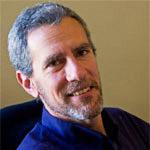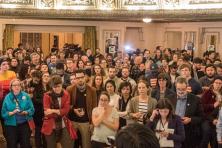With each new IPCC report, we find ourselves a little further out in the open water between the urgency of the climate crisis and the weakness of our response. But every time I think we’ve drifted hopelessly far from reality’s shore, Elizabeth Kolbert throws out a tether, like her terrific New Yorker piece making the case for a carbon tax. The crazier things get, the saner she sounds. She quotes F. Sherwood Rowland, who first diagnosed the threat to the ozone layer from chlorofluorocarbons:
“What’s the use of having developed a science well enough to make predictions if, in the end, all we’re willing to do is stand around and wait for them to come true?”
And in yesterday’s New York Times, Coral Davenport diagnoses — deadpan, Grey Ladylike — why Congress stands around and waits now:
“…[E]fforts to tackle climate change have repeatedly collided with political reality in Washington, where some Republicans question the underlying science of global warming and lawmakers’ ties to the fossil fuel industry have made them resistant to change. The rise of the Tea Party in recent years has also made a tax increase unlikely.”
“Political reality,” indeed….as opposed to plain old, unadulterated, physical, non-negotiable reality. I know we can’t wish it away, but perhaps, as a tribute to the IPCC, we could stop dignifying it by calling it “reality” at all, or at least knock it down a peg with quotation marks.
Yes, yes, I know it IS “political reality” and we have to deal with it. And I suppose “political” mitigates some of the legitimacy that “reality” might otherwise imply.
But still, it devalues the currency to suggest there’s any respectable form of “reality” that accounts for how our political institutions are caving to the fossil fuel industry. Maybe we should reserve the unyielding quality of “reality” for describing what’s physically true, rather than for our self-reinforcing judgments about what is and isn’t politically possible. The former won’t budge, so the latter will have to.
Bold action is urgently needed.
Solutions are available and affordable.
We know what we have to do to unleash them.
Try explaining to your grandkids that there was some other “reality” that trumped those three. How real will it seem to them, compared to what they’re up against?
cross-posted from Getting a GRIP on Climate Solutions




